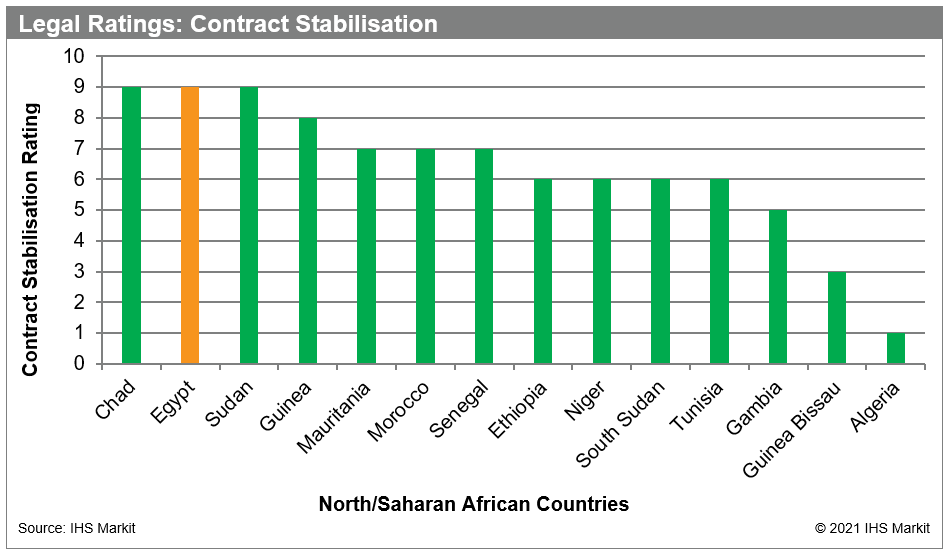Customer Logins
Obtain the data you need to make the most informed decisions by accessing our extensive portfolio of information, analytics, and expertise. Sign in to the product or service center of your choice.
Customer Logins
BLOG
Aug 03, 2021
Egypt's E&P Investment Safeguards
Introduction
Over the past decade Egypt has held various licensing rounds, which
have usually been successful in awarding a good number of blocks,
and it hopes to obtain similar results through the ongoing Egyptian
Natural Gas Holding Company (EGAS) and the Egyptian General
Petroleum Corporation (EGPC) 2021 Egypt Bid Round.
The legal attractiveness of Egypt's licensing rounds for the investor is partly linked to investment assurances present in the upstream contracts. These include a stabilisation mechanism that allows for the possibility of restoring the contractor's initial economic conditions after the occurrence of significant negative economic circumstances deriving from legislative or regulatory changes. The stabilisation clause is connected to a dispute resolution clause providing further protection. Moreover, there are other features of the contract that provide additional stability.
Stabilisation
IHS Markit's PEPS ranks Egypt's contract stabilisation terms among
the best across the North/Saharan African countries.

Egypt's stabilisation clause is an economic equilibrium clause,
the type of stabilisation clause most used globally today.
Generally, economic equilibrium clauses state that if the initial
economic balance between the parties is altered in a negative
manner because of legislative or regulatory changes, the parties
will negotiate contractual amendments reinstating the initial
economic balance.
Since 1998, Egypt has been using the same stabilisation clause.
According to this, if, after contract signature, there are
legislative or regulatory changes "significantly" affecting in a
negative manner the economic interest of the contractor (or forcing
the contractor to remit to the government the proceeds from the
sale of the contractor's petroleum), the parties ("parties" per the
model PSC's title comprise the government, the relevant Egyptian
national oil company (NOC), and the contractor) must negotiate,
within 90 days, contractual modifications restoring the initial
economic balance. If the parties cannot reach an agreement, they
will settle the dispute according to the disputes and arbitration
clause.
Dispute Resolution and Arbitration
The contractor might have access to arbitration to enforce
its stabilisation rights, but the position is not entirely clear.
The dispute resolution forum depends on who the parties to the
dispute are.
As background information, in Egypt, upon a commercial
discovery, the model PSC requires the relevant Egyptian NOC and the
contractor to form an operating joint venture company (a private
company to which the NOC and the contractor each contribute 50% of
the capital) to carry out petroleum operations.
Since 1998, Egypt has been using the same disputes and arbitration
clause. Any dispute, breach, termination, or invalidity between the
government and the parties ("parties" in this
provision means the contractor and the relevant Egyptian NOC) must
be settled by the Egyptian courts.
Conversely, any dispute, breach, termination, or invalidity
between the NOC and the contractor must be
settled according to the arbitration rules of the Cairo Regional
Center for International Commercial Arbitration (CRCICA). Moreover,
unless the parties agree otherwise, the venue of the arbitration is
in Cairo. As a result of the arbitration rules and of the selected
venue, the arbitration is a domestic one.
The award is final and binding, and the execution is referred to
the competent courts based on Egyptian law. However, the execution
of awards in Egypt is not always straightforward.
If the arbitration procedure as described above cannot occur, the
NOC and the contractor transfer the dispute to an ad hoc
tribunal according to the UNCITRAL arbitration rules in force at
contract signature.
Additional Stability
There are two additional features indirectly reinforcing the PSC's
stability:
- First, the NOC in Egypt generally pays corporate income tax (CIT) and royalty on behalf of the contractor.
- Second, each new concession agreement requires Parliament to pass a legislative act authorising the Minister of Petroleum and Mineral Resources to sign a contract on the government's behalf. The concession agreement acquires force of law, so, in case of conflict with the general Egyptian law, the agreement should prevail (as lex specialis).
Conclusion
Egypt's model PSCs contain a stabilisation clause offering the
contractor some stability guarantees. This clause is linked to a
dispute resolution procedure, albeit the procedure might not always
provide access to an arbitration, which, if triggered, in any case
cannot be defined as internationally anchored. Moreover, two
additional stability elements for the contractor are that the NOC
generally pays CIT and royalty on the contractor's behalf and that
concessions have force of lex specialis. These investment
assurances, including the stabilisation clause, should be an
attractive element for the prospective contractor participating in
the 2021 Egypt Bid Round.
A longer, more detailed, version of this piece will soon be available to our subscribers.
Screen upstream opportunities and above-ground risk with PEPS from IHS Markit.
This article was published by S&P Global Commodity Insights and not by S&P Global Ratings, which is a separately managed division of S&P Global.
{"items" : [
{"name":"share","enabled":true,"desc":"<strong>Share</strong>","mobdesc":"Share","options":[ {"name":"facebook","url":"https://www.facebook.com/sharer.php?u=http%3a%2f%2fssl.ihsmarkit.com%2fcommodityinsights%2fen%2fci%2fresearch-analysis%2fegypts-ep-investment-safeguards.html","enabled":true},{"name":"twitter","url":"https://twitter.com/intent/tweet?url=http%3a%2f%2fssl.ihsmarkit.com%2fcommodityinsights%2fen%2fci%2fresearch-analysis%2fegypts-ep-investment-safeguards.html&text=Egypt%27s+E%26P+Investment+Safeguards+%7c+S%26P+Global+","enabled":true},{"name":"linkedin","url":"https://www.linkedin.com/sharing/share-offsite/?url=http%3a%2f%2fssl.ihsmarkit.com%2fcommodityinsights%2fen%2fci%2fresearch-analysis%2fegypts-ep-investment-safeguards.html","enabled":true},{"name":"email","url":"?subject=Egypt's E&P Investment Safeguards | S&P Global &body=http%3a%2f%2fssl.ihsmarkit.com%2fcommodityinsights%2fen%2fci%2fresearch-analysis%2fegypts-ep-investment-safeguards.html","enabled":true},{"name":"whatsapp","url":"https://api.whatsapp.com/send?text=Egypt%27s+E%26P+Investment+Safeguards+%7c+S%26P+Global+ http%3a%2f%2fssl.ihsmarkit.com%2fcommodityinsights%2fen%2fci%2fresearch-analysis%2fegypts-ep-investment-safeguards.html","enabled":true}]}, {"name":"rtt","enabled":true,"mobdesc":"Top"}
]}

